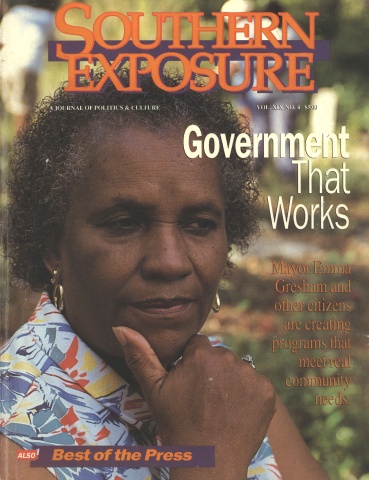Making Government Work

This article originally appeared in Southern Exposure Vol. 19 No. 4, "Government That Works." Find more from that issue here.
Little Rock, Ark. — State health director Jocelyn Elders successfully fought conservative lawmakers to establish health clinics in public high schools statewide. The clinics provide services ranging from dental exams to contraceptives. The first clinic opened in the town of Lincoln after 10 students became pregnant; the next year the pregnancy rate fell to zero.
Jackson, Miss. — The Community Health Advisor Network trains local leaders in rural counties to provide health care assistance for their neighbors. In Humphreys County, 52 trained advisors help 400 residents each week, reaching half the low-income population. “We need an informed and involved community,” says program director Robert Lingafelter. “Doctors and nurses can’t do it all.”
Austin, Texas — Under a new state program, Texas counties have centralized health care services to make access easier for low-income residents. Counties are also required to provide care for poor residents who fail to qualify for other aid. Once a county spends 10 percent of its annual budget caring for the poor, the state pays 80 percent of medical bills.
Opelousas, La. — Mayor John Joseph, the first black ever elected to public office here, has united a community previously divided by race. One secret of his success: bi-racial citizen committees on topics ranging from tourism to race relations. “We found people with a lot of expertise with nothing to do who were just waiting to be invited to serve their city,” Joseph says. “There’s a new spirit of cooperation and pride.”
Lafayette, La. — Using federal Community Development Block Grants, the city has rehabilitated over 600 homes for low-income residents in the past 10 years. The city provides the labor and up to $8,000 in materials, and offers low-interest loans to help owners make up the difference.
Huntsville, Ala. — Frustrated when an abused child was interviewed 14 times by investigators from different agencies, district attorney Bud Kramer founded the Children’s Advocacy Center in 1985. Since then, the center has teamed police, social workers, prosecutors, victim advocates, and doctors to treat more than 1,000 abused children. “Our goal is to provide the services needed to heal,” says clinical director Ethel Amacher.
Davie County, N.C. — When the state ordered local governments to bury less garbage, county landfill manager William “Junior" Barbee responded. He refitted a soft-drink truck as a recycling vehicle, tailored individual programs to local industries, and provided educational materials to residents. Thanks to his efforts, the county has cut its solid waste stream in half.
Gates County, N.C. — Elementary students in this rural community are learning French in “total-immersion” classrooms. Although students in the “Project Stretch” program study every subject except English in a foreign language, they typically score higher on standardized tests than their English-taught counterparts.
Tallahasee, Fla. — The state-sponsored “Preservation 2000” program provides $3billion in bonds over 10 years to buy and conserve undeveloped land. Counties willing to put up money of their own can qualify for matching funds. Five counties have already taken advantage of the program, preserving forests, wetlands, and creeks worth $365 million.
Tags
Betty Meeler
Betty Meeler is a volunteer with the Institute for Southern Studies. (1991)